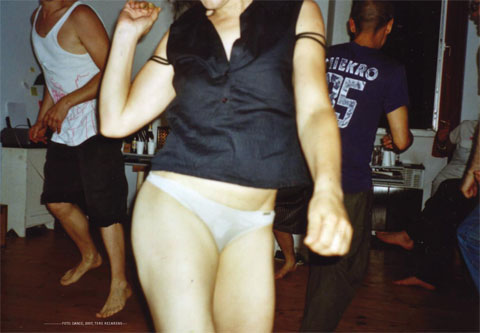Are You Precarious?
13 Mar 2008

From the publication more work to do, self-organization in precarious working conditions.
Sylvia Schedelbauer’s video presents a direct interaction with a discussion that we and a number of others in our shared environment are conducting in Berlin. The ‘external’ reason or original context triggering the video’s production was the project totale partizipation RADIKALE ENTSPANNUNG, wherein a week-long workshop we discussed the paradox of how individual initiatives become absorbed into neo-liberal processes, and reflected on our working and living conditions as ‘cultural producers’, including our own entanglement.
At present Sylvia has a grant and is in San Francisco for an extended stay. She decided to directly contribute to our discussion in Berlin and began to interview people who are part of her milieu there. Here discussion partners are therefore also ‘cultural producers’ in the broadest sense. She then sent us the interviews, recorded on DVD. Here in Berlin they served as a kind of ‘long-distance’ contribution to our discussion, similar to communicating with a view telephone, and some of the aspects expressed in these interviews featured prominently in our considerations. Moreover, our group was extended by six additional persons.
The interviews focus on the particular individual living and working conditions of the interviewees. Sylvia wanted the aspects she encountered there related to the &ldquot;precarization of living and working conditions&rdquot; to flow into our considerations. I see these spontaneous interviews as a kind of fundamental step, the act of reflecting on ‘self-engagement’ as an approach for further steps.
 Steve Polta and Katherin McInnis bluntly describe their everyday working situations. Both tell how they have to combine several jobs--multi-tasking is for both of them a necessary strategy. There seems to be little time for their artistic work. Their motto could be: &ldquot;Always keep going, just don’t think about it.&rdquot; That sounds all too familiar. And that’s what I like about these discussions: the perplexity and then the impulse to see the similarities.
Steve Polta and Katherin McInnis bluntly describe their everyday working situations. Both tell how they have to combine several jobs--multi-tasking is for both of them a necessary strategy. There seems to be little time for their artistic work. Their motto could be: &ldquot;Always keep going, just don’t think about it.&rdquot; That sounds all too familiar. And that’s what I like about these discussions: the perplexity and then the impulse to see the similarities.
Clarifying what is meant by &ldquot;self-engagement&rdquot; is a first step. Often I catch myself talking with my friends about simple strategies for coping with stress and our physical limits, and as a counteraction about the &ldquot;almost insatiable longing for recreation&rdquot; (1). Work is engulfing all areas of life. I’m no champion of ‘leisure time’, but I do think for example that the economization of friendship is worth more than just cursory consideration.
Taking a feminist perspective, Kara Herold then speaks in the video about ‘community’ as an organizational form, replacing the ‘normal family’. Urban nomads build and cultivate a network through which they support one another and within which they operate. I see this structure as the starting point and basis for self-organized work.
 But: what does that mean when I work, so to speak, ‘permanently’? Even meeting up with friends in a bar quickly turns into the ever-recurring discussions about work. Projects are checked out: how important are they? How are they coming along? Does this not sometimes overwhelm us physically? How can our body cope? Get yourself in shape. That’s part of the keeping-yourself-productive. Your own body has to stay usable. When I’m able to bring stress, regeneration and reproduction into a perfect balance, I’m then in a position to exploit myself fully. And what if I actually enjoy this? For example like Bill Daniel, who chose voluntary self-marginalization as his way while romanticizing it?
But: what does that mean when I work, so to speak, ‘permanently’? Even meeting up with friends in a bar quickly turns into the ever-recurring discussions about work. Projects are checked out: how important are they? How are they coming along? Does this not sometimes overwhelm us physically? How can our body cope? Get yourself in shape. That’s part of the keeping-yourself-productive. Your own body has to stay usable. When I’m able to bring stress, regeneration and reproduction into a perfect balance, I’m then in a position to exploit myself fully. And what if I actually enjoy this? For example like Bill Daniel, who chose voluntary self-marginalization as his way while romanticizing it?
Understand self-marginalization as a voluntary strategy and thus a solution, and not perceive oneself as a victim. I love everything that stresses me--for me, such a claim functions only as an admitting of failure. In this way, one’s own way of life is exploitable and usable down to the last detail. Everthing that’s difficult is transfigured, glorified...granted, is there an alternative?
Another question, which I feel to be fundamental to the whole discussion, comes from Isabell Lorey: She defines the construction of the self per se as paradox and speaks of subjects who under the premises of self-realization are ready to give their all and suffer for it. Is it possible that the cultural producer who feels herself to be ‘alternative’ is in fact perfectly exploitable in neo-liberal invocations? (2)
What does that mean for us? Radical relaxation?
Translated from the German by Paul Bowman
Christine Woditschka studied Fine Arts at the University of Arts Berlin. Her video works and photographs deal with questions about urban reality and architecture. In 2007 she organized the participatorian project totale partizipation Radikale Entspannung at art transponder e.v. together with Caroline Lund, in which the question of (self-)precarization was discussed with the invited artists. The video Are You Precarious? by Sylvia Schedelbauer was shown, too.
◊
(1,2) Isabell Lorey: Vom immanentem Widerspruch zur hegemonialen Funktion.
Biopolitische Gouvernmentalität und Selbst-Prekarisierung von KulturproduzentInnen. In: Gerald Raunig, Ulf Wuggenig (Hg.): Kritik der Kreativität, Wien 2007, p.130